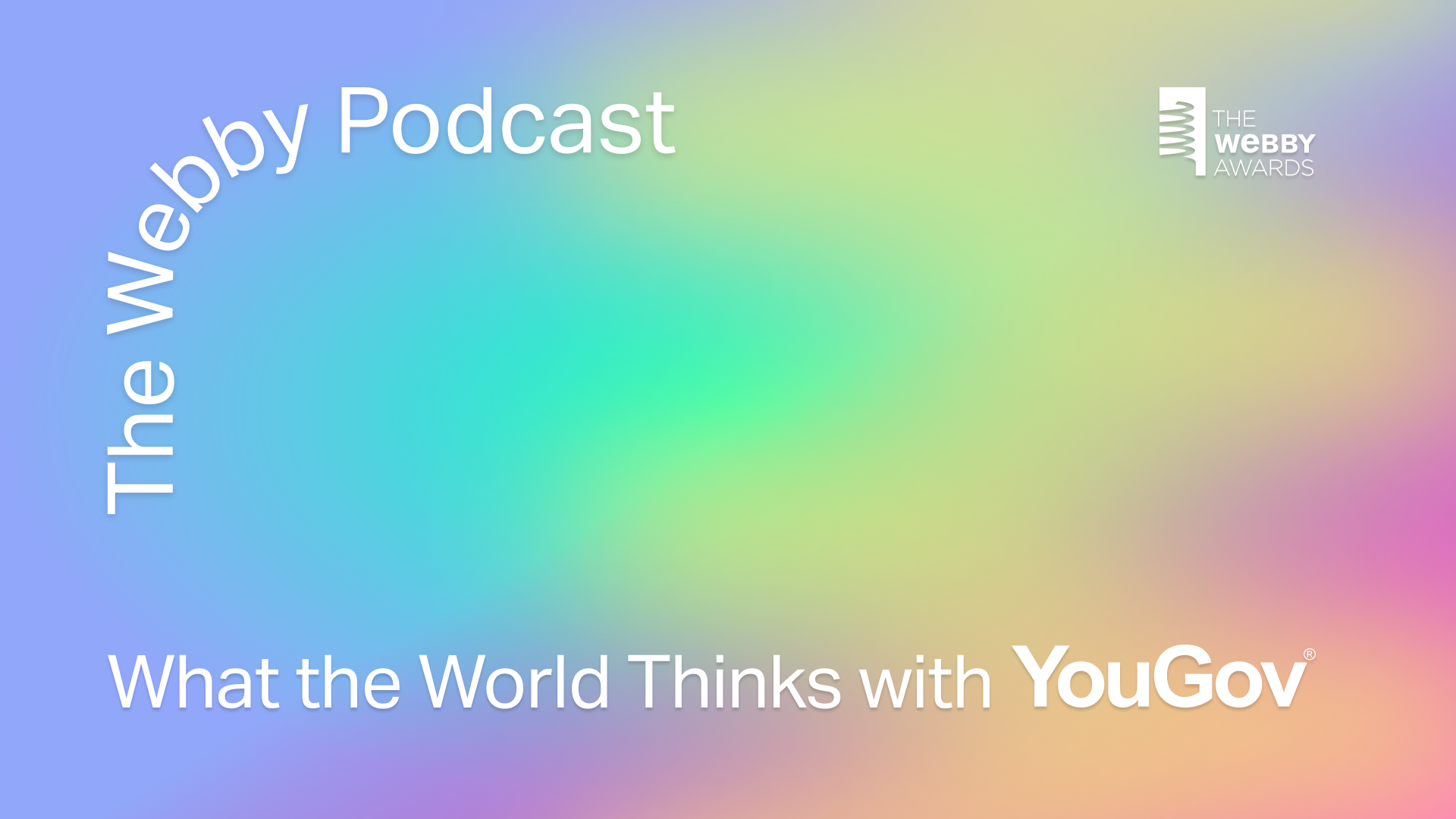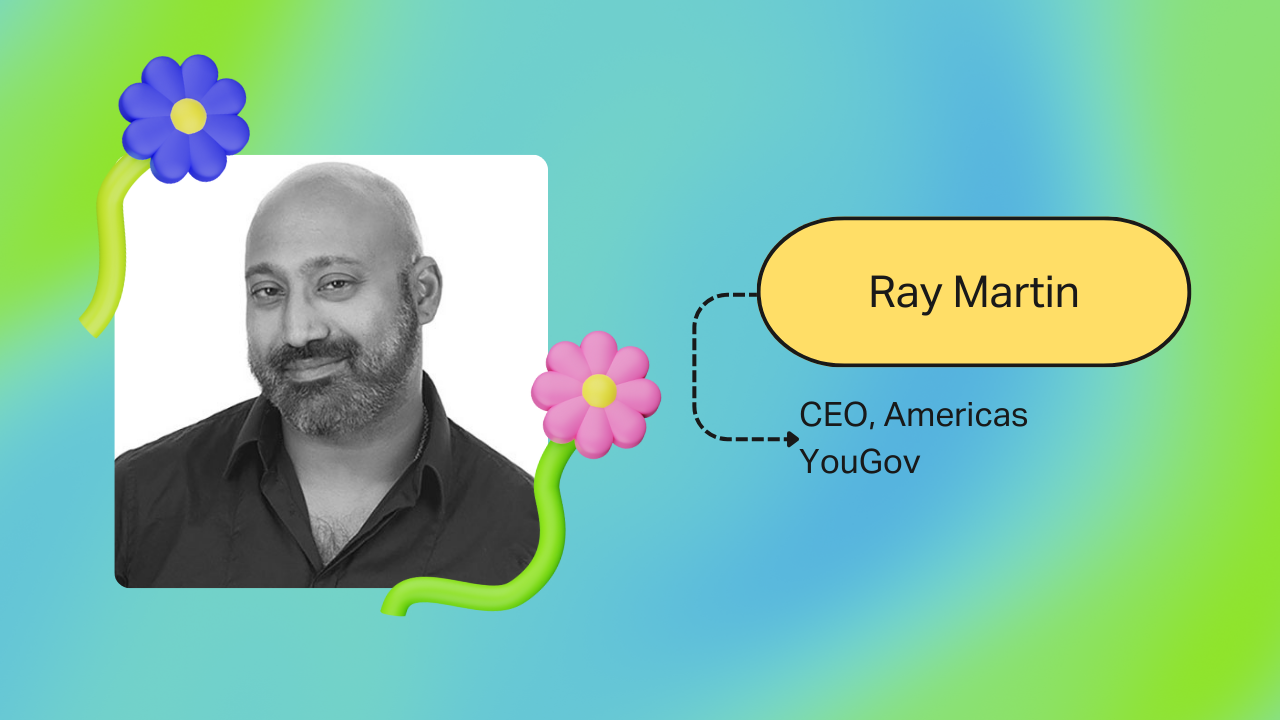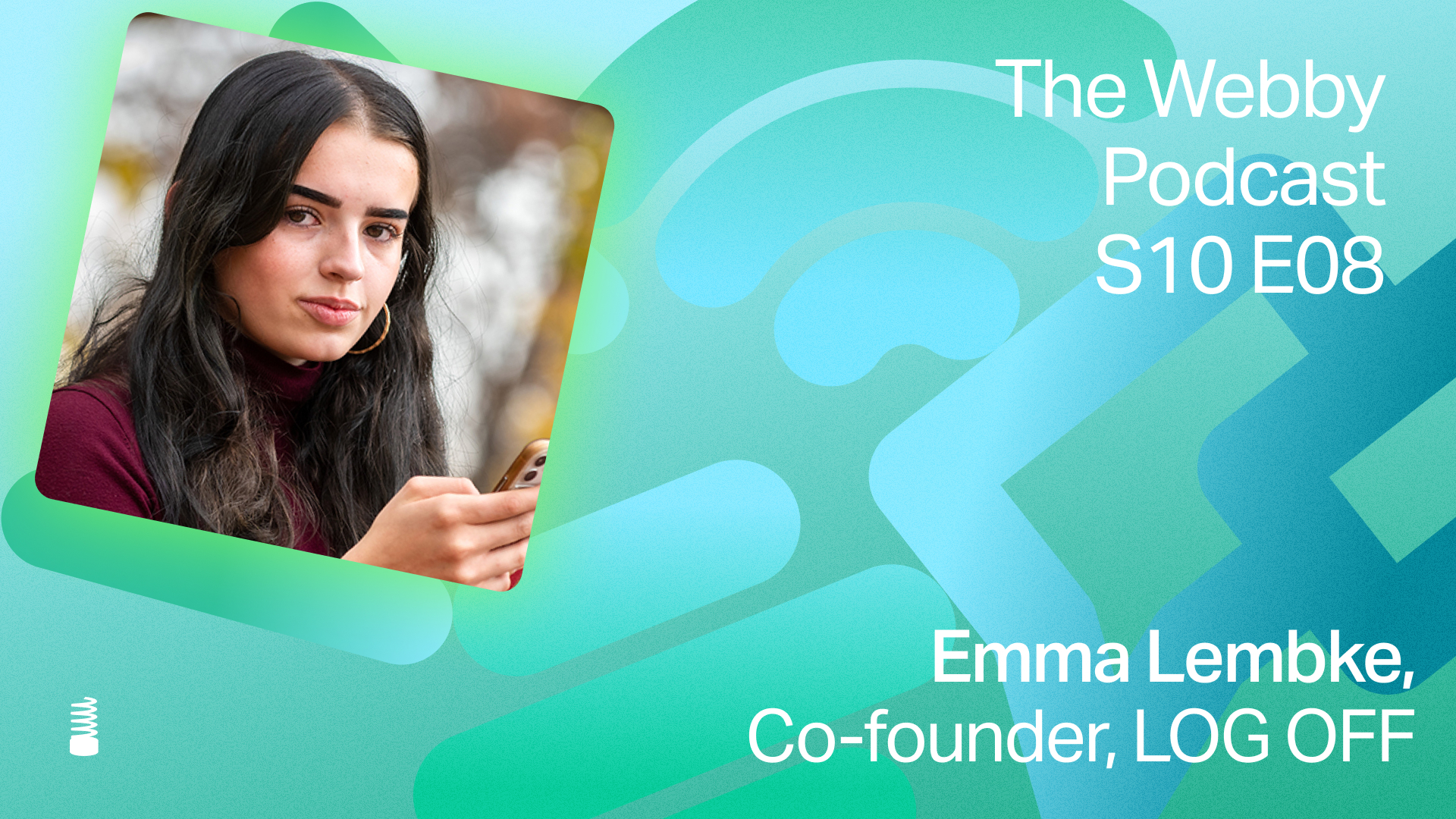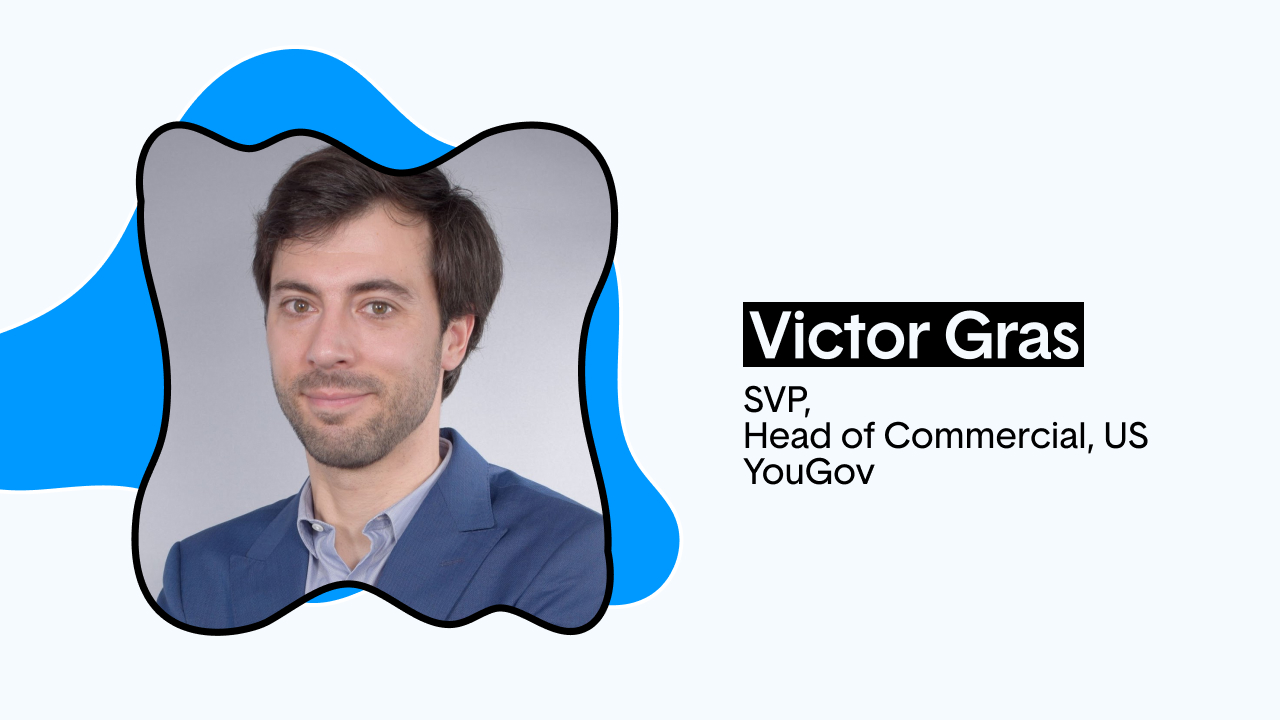What The World Thinks with YouGov is a new mini-segment on The Webby Podcast. In the three-episode series we invite YouGov, our sponsor and an international research data and analytics group, to surface consumer insights related to the topics of each episode. Webby Podcast host David-Michel Davies is joined by Hamish Brocklebank, Chief of YouGov Safe to explore how consumers are feeling about citizen journalism, sustainability and more.
Jump to Each Segment
- Segment 1: Citizen Journalism
- Segment 2: Sustainability and Fashion
- Segment 3: Food Culture
What The World Thinks with YouGov is part of a larger partnership. It includes The Webby 2022 Trend Report, which includes a survey conducted with YouGov to learn what over 3,000 people across the U.S. are approaching digital trends in online gaming and livestream video. Coming out in January!
Segment 1: Citizen Journalism
After speaking with Eliot Higgins of Bellingcat, David-Michel sits down with Hamish Brocklebank of YouGov to explore how consumers are feeling these days about independent journalism, while navigating the seas of misinformation. Listen below at the 43:48 mark!
Sponsored by YouGov
DAVID-MICHEL DAVIES, HOST: To close out, we wanted to further today’s topic through a new segment we’re calling “What The World Thinks with YouGov,” where we’ll surface consumer insights powered by YouGov, an international research data and analytics group.
For each segment, I’ll be joined by Hamish Brocklebank, Chief of YouGov Safe. Let’s get into it.
DAVIES: We had a discussion with Eliot Higgins, who’s from Bellingcat. And we talked a lot about how the Internet legitimized citizen journalism. Can you touch on what research you may have done at YouGov? And how today’s consumers are thinking about misinformation and citizen journalism. How do they make decisions about what they trust and don’t trust?
HAMISH BROCKLEBANK: It’s interesting what they trust or don’t trust. A lot of the data is showing that for a minority of the population, but a large one, they are having a hard time trusting what is and isn’t good sort of journalism or honest journalism or unbiased journalism. You know, you look at it the other way, it’s about 65% of Americans are pretty confident they, for instance, can tell the difference between real and fake news. But that still means that 35% of Americans don’t feel they can tell the difference between real and fake news, which is like a sizable number.
Also, by the way, 65% of Americans think they can tell the difference because everyone thinks that they’re clever and smarter than they are. So that’s quite a scary number. And if you look at it in terms of how people’s perceptions of the traditional, people have much less trust in the traditional media outlets on both sides of the spectrum. By the way, it’s not it’s not a necessarily a left or right issue. You know, the trust that that CNN and the New York Times on the one hand has is lower. The trust that Fox News on the other side of the spectrum has is also lower.
So people that don’t necessarily know where to get information and stories from and therefore we are definitely seeing good citizen journalism can take off. And because it’s often covering stories that, I loathe to use the phrase the mainstream media, but the mainstream media are not necessarily covering, which is providing a valuable service and people are engaging with it.
You know, there’s a case going on right now, you may be familiar with. I can never pronounce the surname right now there’s a lawyer called Donziger, who sued Chevron and Chevron has now countersued him and applied a private prosecution that sent him to prison in New York, and people are calling for Biden to investigate because it’s very, very well I don’t want to be done for defamation, it appears there might be corruption going on here. And this is something that citizen journalists are covering extensively. But the sorts of traditional newspapers on both the left and the right are almost remaining silent on. So those citizen journalists, who are covering that particular story, are getting a huge amount of engagement. And there are a lot of people who are glad that people are writing about that particular story, because it’s actually important to them.
On the activist side of things, whatever type of activist it may be, we are seeing that people are increasingly socially conscious about you, obviously, the environment being one of those things. And we are seeing that citizen journalism is sort of satiating the the sort of needs and desires of those activists.
DAVIES: Is there a relationship between the sort of like, decline in trust and institutional journalism, but potentially a rise in trust among, you know, either citizen journalists or independent journalists, some of which are very credible and trustworthy, and some of which are not?
BROCKLEBANK: People do have a declining trust in the institutions because they’re basically seeing them as paid shells, or they’re seeing the conflict of interests. Then of course, the sort of citizen journalists, you know generally – have that much less sort of – are much less beholden to large corporations, or whatever else it may be. So that’s sort of where we’re seeing, but obviously, consumers just have to be extremely careful when they are looking at that to make sure that they’re not, you know, reading – they’re reading something that’s actually truthful as opposed to something that’s just designed to get clicks.
So it’s a, it’s a tightrope, but it’s definitely an interesting one. Citizen journalism is doing a lot of wonderful things. If you look at it in, you know, the financial markets, I think it’s extremely interesting. Now, I’m not necessarily talking about like the Reddit stuff going on in terms of, you know, the pump and dump scams, but the stocks, that’s the word I’m looking for. But I’m talking about if you follow – you know, there’s there’s short sellers who write detailed thesis is about why certain companies are frauds. And they do a lot of research into it.
So a classic example – there’s a, – there was a big German company called Wirecard – and they may still exist in some form or other – but Wirecard are a big European payment providers similar to sort of PayPal. And they were the big tech success story of Germany. They had government – German government ministers on their board, all the stuff and they worth 10s of billions. By and large, the mainstream press barely covered them at all, until right before they went bust, and got done as a massive fraud. But there were 10s, if not hundreds of citizen journalists who for years, were basically investigating the frauds that the company was perpetrating. Also in that particular case, the air, they were in bed with the Russian mafia, it’s almost as you couldn’t make it up. And all of this stuff was because of individual, dogged persistence – citizen journalists. Very little of it was covered at all by any of the mainstream press. The Financial Times eventually wrote about it, but only after government – sorry the courts in Germany started throwing charges at Wirecard. And that’s just one – and sorry the reason why in that case, is also because Wirecard has such a good PR, or had such a good PR team, they were able to shut down all the dissent that was going on in the press.
DAVIES: So there in comes, the lack of trust, in institutional journalism.
BROCKLEBANK: Yeah, exactly. So you know, and, you know, it’ll be interesting to see, you know, they’re just upset a whole load of people. It’d be interesting to see if Tesla, what happens there – it just – just in terms of there are a lot of citizen journalists who are calling out Tesla, in particular Elon Musk for, you know, potentially fraudulent behavior and have been for a very long time. And it will be very interesting to see if in five or ten years time if they are proven correct, or if they were not correct. But right now, they’re the only people who are by and large – I mean, Elon Musk is an easy target, so the press are probably throwing more stuff at him than they would other people. But I still think they’re probably giving him a pretty – the mainstream press are probably giving him a much easier time than he would be getting if he wasn’t quite so rich. But anyway, that’s just my personal opinion, just to upset all the Tesla.
DAVIES: There’s a lot of them, be careful.
Segment 2: Sustainability and Fashion
In the next segment, Hamish and David-Michel discuss how consumers have started to care about purpose-driven brands, following the pandemic. Listen below at the 28:48 mark!
Sponsored by YouGov
DAVID-MICHEL DAVIES, HOST: Tell me a bit about how consumers desires for sustainability, and a mission in what they buy, and – you know, making sure that what they buy is not polluting the earth – how has that changed since the pandemic.
HAMISH BROCKLEBANK: I mean, not just since the pandemic, but over the last five years, sustainability in retail is a top issue for all age demographics, and has been growing and growing. Younger people more so. So for about a quarter of people under 34, It’s that number – it’s their top issue, as opposed to 18% across the net rep. We’re seeing people, more educated people, it matters more for them.
We’re also seeing that more than half of the population have boycotted a good or a service from a company that they think is unethical. Traditionally, it’s always been, you know, whether you employed child labor in Vietnam has been the main sort of thing. But now it’s going beyond that, to obviously sustainability specifically, like “Are the materials sustainable,” you know “Is their manufacturing process polluting the environment? Is their manufacturing process doing good in the world?” And they are happy to pay a premium, and decide to shop at one pace rather than another because they perceive that brand as ethical.
DAVIES: What are consumers’ ultimate expectations for these, as you would call “ethical brands?” And are they – is that – do you think it’s like – I mean, this is a, the answer is clearly going to be a mix, right? So I appreciate that. But there’s going to be you know, some of its virtue signaling some of its going to be wanting to – in the same way people want to buy a jacket and sort of show everybody that that’s the jacket they buy. But I would imagine there’s other expectations that are that are more substantive as well.
BROCKLEBANK: And so that is a big, you know, part of wearing Patagonia is not just that you want to look like a venture capitalist walking around San Francisco. But that you’re actually buying a product where the product is doing good for the environment, and the company does good for the environment. And yeah, and the same with with Allbirds, as an example. People know, that Allbirds, their stuff is sort of ethically sourced as well.
DAVIES: Are you seeing and polling the counter to that; which is that, you know, people are negatively looked out for not – in I mean, it’s, you know, there’s the flex of like, “Look, I’m wearing a Patagonia jacket.” Are people who are not wearing the Patagonia jacket and are wearing the – you know, I don’t want to disparage any other brand – a brand that’s less sustainable. Are they getting sort of the negative view? Are people judging those people poorly?
BROCKLEBANK: We actually haven’t seen – from memory – we’re not seeing that, we’re not seeing the negative bit. I mean, I’m sure if you’re wearing like a fur coat, yes. I don’t know what a big fur coat brand is. Actually no, I’ll tell you one area we are seeing it: Fast fashion is becoming – we’re starting to see fast fashion becoming a bit of an issue and people actively not wearing fast fashion products.
Segment 3: Food Culture
In our final segment, Hamish and David-Michel explore how consumers’ food consumption habits have shifted throughout the pandemic, from a larger shift to vegetarianism and veganism, to individuals ordering healthier foods via grocery delivery, to Gen Z’s lower reservations around GMOs. Listen below at the 44:00 mark!
Sponsored by YouGov



 Twitter
Twitter


